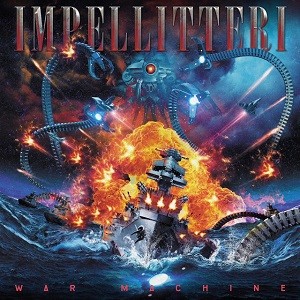OPETH’s Mikael Åkerfeldt Talks Deliverance, Damnation And Death Metal - “Damnation Was An Experiment That Ended Up Changing The Band Drastically In Every Way”
January 3, 2016, 8 years ago

Drowned In Sound caught up with Mikael Åkerfeldt recently and they spoke about the recent reissues of Deliverance and Damnation and the band’s rich history.
Here are a few excerpts from the chat:
DiS: The Deliverance and Damnation records are being reissued now as they were originally intended. Is this something you have always hoped to be able to do? How frustrating was it at the time when the record label decided to release the two albums separately?
Åkerfeldt: “On the contrary, it was my decision to separate the two as far as I remember. We wanted to have a longer time to promote the records which is why they were put out separately. The reissue makes sense as they’re recorded at the same time. They’ve been remastered and remixed and sound amazing. But they’re also old records now. I have a different feeling about them and don’t necessary feel the need to promote them separately, or at all to be honest. It’s just a good package of two of our hopefully-soon-to-become-classic-records. They sound much better now than they did back in the day if you ask me. We haven’t added anything or re-recorded anything. They’re the originals sounds but tweaked so it sounds better and closer to how I wish they had sounded in the first place. Steven Wilson did the Damnation mix a while back out of his own initiative. Bruce Soord (The Pineapple Thief) did Deliverance and made it sound more “real” than the original mix. It was a disastrous recording and it didn’t have a place in my heart until now. I was indifferent to that record, but now I think I love it. Only took twelve or thirteen years!”
DiS: Obviously this pair really showcases the two different sides of Opeth. I’ve always wondered how you see this contrast? Have you always been trying to balance the two?
Åkerfeldt: “Damnation was an experiment that ended up changing the band drastically in every way. We’ve always had the soft side, we’ve had the ballads and the acoustic interludes always, but never had we done anything like that. It was met with a shrug at the time, but now it’s highly regarded by our fans. Deliverance is a really good record but marred by the difficult recording and there were severe strains within the band. It was a horrible time. At least now I can exhale and be a little bit proud of it. Wilson did a great job on that one and Andy Sneap really “saved” the recording back then, but it sounds better now I think.”
DiS: Has leaving behind the death metal elements made songwriting an easier, or more natural, process for you at all? Whilst I love Watershed, listening back to it recently I felt that it sounded like a hard record to write, largely because the contrast between the extreme metal moments and other moments felt more severe than normal. Pale Communion, in contrast, has a real natural flow to it…
Åkerfeldt: “I think I’ve focused a bit more on the vocals. Death metal vocals only needed rhythm and feel, but writing vocal lines you need melody too. So it’s harder because of that. If I write a death metal song I know it’s good enough even before the screams are added: if the riffing and arrangement is good, the song is good. Now I have the vocals carrying the song a lot more which makes it harder, but once you hit the spot it’s a more fulfilling feeling to me. Watershed is an apt title as the album was a watershed moment. Can’t remember if I chose that title because of it, but it couldn’t have been better really.”
Read more at Drowned In Sound.











